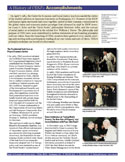History & Accomplishments
CESJ History and Accomplishments
On April 7, 1984, the Center for Economic and Social Justice was born amidst the clatter of the student cafeteria at American University in Washington, D.C. Pioneers of the ESOP and human rights movement had come together, united in their common commitment to the global vision and economic justice paradigm first advanced in 1958 by ESOP inventor Louis O. Kelso and the “Great Books” philosopher Mortimer Adler, and the concept of social justice as articulated by the scholar Rev. William J. Ferree.
The philosophy and purpose of CESJ were soon crystallized in written statements of our founding principles and core values. Since the launching of CESJ, members have gathered every month, starting each meeting with a participatory reading of our core values and code of ethics. CESJ’s principles underpin our record of achievements.
Major CESJ Initiatives
Since the early 1970s, many of the model employee stock ownership plans and the first ESOP laws in the U.S., Egypt, and Central America resulted from the work of CESJ founders and members.
In 1985, CESJ members initiated the Congressional legislation which created President Ronald Reagan’s Presidential Task Force on Project Economic Justice. This 1986 bipartisan task force offered a bold regional strategy of expanded capital ownership for economic revitalization in Central America and the Caribbean.
In 1987, CESJ representatives presented the Task Force report, High Road to Economic Justice, to President Ronald Reagan and Pope John Paul II. CESJ’s compilation, Every Worker an Owner, served as the orientation book for the task force. This book was later translated into Polish and 40,000 copies were distributed throughout Solidarity channels in Poland, prior to the collapse of the Soviet system.
To build equity with efficiency at the workplace, CESJ developed a leadership philosophy and management system for 21st Century corporations, known as “Justice-Based ManagementSM” (which CESJ originally called “Value-Based Management”). In 1991, at a CESJ conference for Vatican scholars hosted by Achille Cardinal Silvestrini, CESJ presented its global award to three ESOP companies — Avis Rent-a-Car, Fastener Industries, and Allied Plywood Corp. — for exemplifying the JBM concept and applying principles of economic and social justice in their corporate ownership structures, governance and operations.
CESJ invented the concept of “ownership unions” to go beyond the wage system limitations and conflict orientation of “labor unions.” This institution would serve a broader constituency — today’s non-owners — in organizing and transforming them into worker-owners and citizen-owners.
In December 2002, CESJ completed a major policy reform proposal under a grant by the William H. Donner Foundation, entitled Capital Homesteading for Every Citizen: A Just Free Market Solution for Saving Social Security. On January 1, 2004, CESJ released to the public the updated and expanded edition of Capital Homesteading for Every Citizen, which is being distributed to policymakers, scholars and the media. The proposals in the book led to the introduction of the first legislation for establishing for-profit Citizen Land Development Cooperatives (“CLDCs”), by the late Illinois State Rep. Wyvetter Younge in early 2004. Before her death, Rep. Younge managed to get the legislation through the Illinois House of Representatives by a vote of 114-0.
From 2005-2015, CESJ joined with the Coalition for Capital Homesteading and other organizations and activists for an annual “Own the Fed” rally at the Federal Reserve Building in Washington, DC. This protest rally, which CESJ plans to restart, is aimed at changing Federal Reserve monetary policy to stop monetizing U.S. government debt and propping up too-big-to-fail banks, and to return to its original power to create money for industrial, commercial, and agricultural growth needs, while creating new citizen-owners of the new growth.
CESJ has developed practical strategies and social technologies centered around basic monetary and credit reforms for expanding capital ownership opportunities to every person. Such means include JBM S-Corp Employee Stock Ownership Plans for employees (ESOPs), utilities customers (CSOPs), residents of new and redeveloped communities (Citizen Land Development Cooperatives), and all citizens through leveraged personal Capital Ownership Accounts (COAs). CESJ also created the Homeowners Equity Corporation (HEC) as a solution to the rampant home foreclosure crisis, and new way of financing home ownership.
To implement these ownership democratization vehicles, CESJ has worked with local leaders and citizen activists to redevelop communities such as St. Louis, MO; Cleveland, OH; East St. Louis, IL; Hartford, CT and Louisville, KY through model Citizens Land Development Cooperatives. CESJ is seeking to demonstrate in at least six urban and six rural communities Economic Democratization financing for private sector growth through local banks with access to the discount window of the regional Federal Reserves.
CESJ is proud to be a strategic partner of Descendants of American Slaves for Economic and Social Justice based in St. Louis, Missouri. CESJ helped establish the Coalition for Capital Homesteading, and the Canada-based Global Justice Movement, and drafted the Platform of the Unite America Party.
CESJ conceived Justice University® in 2008 to introduce within all levels of academia the Just Third Way paradigm as a socio-economic alternative to monopolistic capitalism and collectivist socialism. Following years of discussions, planning and informal workshops to introduce this online, global classroom, Justice University launched its first certificate program in 2019 for international Humphrey Fellows. In 2021 CESJ conducted a 10-week Justice University program for CESJ members. CESJ is working with leaders in academia to form Justice University programs in universities, and with DAS4ESJ to create a model citizen ownership education program in St. Louis.
For the full description of CESJ’s history and accomplishments <<click here >>
